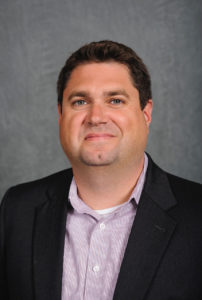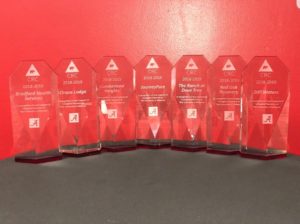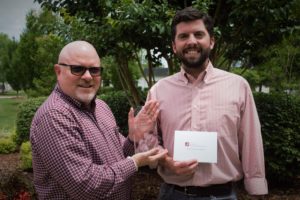Staying sober in college is about as foreign of an idea to some as going to a restaurant and not eating. You can watch just about any movie or tv show that takes place on a college campus and you’ll see keg stands, Jell-O shots and beer bongs galore. They even have a way of glamorizing the hangovers and next morning walks of shame. So, it really is no wonder some young adults in recovery wonder how they can possibly stay clean while still having a meaningful college experience.
 Greg Snodgrass remembers that feeling. He is a Regional Outreach Coordinator at Cumberland Heights and spearheaded the design for Collegiate Recovery at the University of Alabama. But before all his success, he was lost.
Greg Snodgrass remembers that feeling. He is a Regional Outreach Coordinator at Cumberland Heights and spearheaded the design for Collegiate Recovery at the University of Alabama. But before all his success, he was lost.
“I lived my life in addiction for many years. I never thought that addiction would happen to me. I thought I could control it and that apparently was not the case. In my opinion drugs and alcohol were fun and that’s why I enjoyed them. However, at some point the drugs and alcohol stopped working and my life became miserable. I destroyed my college transcript and never thought I would return to college,” said Greg.

Greg Snodgrass, Regional Outreach Coordinator
While in treatment in 2004, Greg was encouraged to apply to two Collegiate Recovery Schools. A Collegiate Recovery School is one with a supportive environment within the campus culture that reinforces engagement in activities free from drugs and alcohol. It is designed to provide an educational opportunity alongside recovery support to ensure students do not have to sacrifice one for the other. Despite Greg’s fears that he wasn’t smart enough to get into a program like this, he was accepted, went back to school and thrived in a way he never thought possible.
“I sat in the front row when I used to sit in the back of the class. I raised my hand, turned in my homework, went to office hours with the professor, asked for help, and never missed class unless it was a legitimate excuse,” said Greg.
Greg graduated magna cum laude. He has since make it his mission to help other college students who are struggling.
“I pictured college through the eyes of John Belushi in ‘Animal House.’ In many aspects, the party scene has not changed since the movie was first released 40 years ago. Collegiate Recovery is like a sober fraternity/sorority. It is a fellowship that enables recovering students to create an environment on campus safe and fun. Collegiate Recovery is designed to empower those in recovery to strive for success. Collegiate Recovery helps to squash the fear of ‘I am less than’ or ‘I am not smart enough.’ The program turns our fear into confidence by building a fellowship of students that help one another achieve the unimaginable in academics and life,” said Greg.

Cumberland Heights and Still Waters was recognized for their support of Collegiate Recovery
The three longest standing Collegiate Recovery Programs are Rutgers University, Texas Tech and Augsburg University. One of the first replication model Collegiate Recoveries is here in Nashville, Tennessee at Vanderbilt University. Once accepted in the program, students have access to academic advisors, tutors, study rooms, printers, computer labs, meditation rooms, seminar courses, peer mentors, housing, scholarships, waived out of state tuition opportunities, recovering students and all other resources your higher education tuition has to offer. Essentially, it’s a fellowship. This is important because Academic Institutions can be a hostile environment for those in early recovery according to Greg.

“Collegiate Recovery helps you to change that lens and experience college as a recovering student. Students soon realize they can have more fun in their recovery than they did in their addiction. You can be successful in academics, friendships, relationships, life decisions, future careers and living life on life’s terms by being a part of a recovery fellowship on campus. I am living proof that it is possible to stay sober and enjoy life in college,” said Greg.
If you are your child is interested in learning more about Collegiate Recovery, contact Greg at greg_snodgrass@cumberlandheights.org or 615-879-7125.










